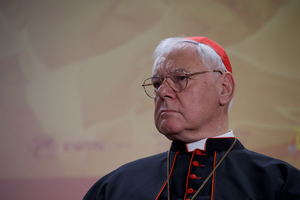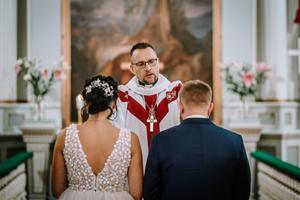The Liberation of Mosul: Christian Hopes and Fears
The long-awaited battle to rout the Islamic State group from Iraq’s former Christian heartland is now under way.

The liberation of Mosul and its surrounding villages from the grip of the Islamic State group (ISIS) is offering hope for Iraqi Christians and other religious minorities in the region, but restoring trust and guaranteeing security will be a much longer process once the military operation is completed.
This is the general opinion of Iraqi Christians and aid workers after Iraq’s Prime Minister Haider al-Abadi declared Oct. 16 the beginning of an assault to recapture Mosul, the country’s second-largest city.
Around 30,000 pro-government forces made up of the Iraqi army, Kurdish peshmerga soldiers and Sunni tribal militia are taking part in the liberation. Coalition forces are also providing military support largely through air power. At the time of this writing, al-Abadi said the operation to retake the city was proceeding faster than planned.
The liberation comes two years after ISIS invaded Mosul and surrounding towns and villages, many of which were predominantly Christian, causing many casualties, inflicting countless atrocities, and forcing hundreds of thousands to flee.
Around 125,000 internally displaced Christians were joined by other religious minorities, including Yazidis and Shiite Muslims. Those who didn’t end up in camps or find refuge in other parts of Iraq fled the country, many seeking asylum in nearby Turkey, Lebanon and Jordan.
Once the city and region are liberated, Christians are therefore expected to seek to return to their homes. But their problems are unlikely to end there.
“There needs to be a healthy sense of reality, and one shouldn’t imagine that once ISIS is defeated life will be back to normal,” said Father Benedict Kiely, founder of Nasarean.org, which helps assist persecuted Christians, and a frequent visitor to Iraq.
Father Kiely said concerns revolve around three main issues: who will protect the Christians when they go back; how can they live with their neighbors, many of whom betrayed them by taking their homes or siding with ISIS; and who will run the region and towns once they are liberated.
He said ISIS is the “great monster” now, but he recalled that even before they came on the scene, Iraqi Christians were being killed and kidnapped by other jihadists. Once ISIS leaves, another group with a different name is likely to “take their place,” and so “who will protect them if they can go back?”
Lack of Trust
Reports are already circulating of some Christians taking matters into their own hands and creating militias to defend themselves and their property. They have little faith in the regional and central governments, especially after protection that was promised them in 2014 did not materialize.
A major concern is lack of trust, one echoed by Elisabetta Valgiusti, an EWTN documentary filmmaker on Iraq and persecuted Christians. After ISIS’ 2014 offensive, a number of Muslim neighbors of Christians contacted them to say they had “got their homes and were taking their stuff,” Valgiusti said.
She also raised the possibility that some Muslims will have been radicalized by ISIS and will be hard to spot after the liberation, as has happened after the freeing of other Iraqi cities in the past.
“Most of them were forced to live alongside ISIS, but some actively joined them,” Valgiusti said. “But how do you recognize a jihadist, even here in Europe?” Already there are reports of ISIS fighters in Mosul shaving off their beards and changing the way they dress to blend in with the civilian population.
But like Father Kiely, Valgiusti believes greater concerns involve safety guarantees for Christians and clarity over who will rule them. “These Christian villages are in the middle of a completely Muslim zone,” she noted, and have always felt “isolated.” She also highlighted that few Iraqi Christians can leave the country because they don’t have refugee status (they are internally displaced people) and so feel trapped with few rights.
‘No Real Plan’
Father Kiely voiced apprehension that there also “seems to be no real plan” once ISIS is defeated and that hopes for some kind of Christian protectorate are perhaps overly optimistic. He said some Iraqi Christians he had spoken to believe that such an enclave would take at least 10 years to realize, and it remains unclear who will create and manage it.
“Neither the U.N. nor the U.S. shows any interest in protecting Christians or anyone else,” he said.
Other factors impacting whether Christians will return to their homes are the state of their houses and churches, some of which have been used for sacrilegious acts such as torture, and whether they will have jobs. All of this makes some Iraqi Christians believe that relatively few will actually go back, with some estimating that only 20% to 30% of Christians will do so, according to Father Kiely.
He nevertheless said it’s important to remain hopeful and recalled the resilience of Iraqi Christians, who for many years have suffered this cycle of “return, persecution, exile and then return.”
Despite the challenges, Alesssandro Monteduro, director of the Italian branch of the Catholic charity Aid to the Church in Need, also believes the liberation “feeds hope” and agrees that at the same time, once it is permanently freed, Iraqi Christians must “face the reality.” The city of Mosul, he said, “will be totally different from the one abandoned in 2014 by those who took refuge in Kurdistan,” he said.
Some relationships will also be hard to heal. “Meeting so many Christian families in Erbil or Duhok [in Kurdistan], it was easily perceptible, for example, that a source of deep pain for them was having been betrayed by their neighbors, Sunni Muslims who had preferred to accompany the men of the caliph when they first arrived in the city.”
Civilians at Risk
By Oct. 20, Iraqi military sources had claimed victories in 54 villages around Mosul, but an estimated 1.5 million people remain trapped in the city and unable to escape, hostage to an around 3,500 to 5,000 ISIS fighters. Foreign fighters have reportedly disappeared from Mosul, leaving its defense to local ISIS militia who are executing civilians who show support for the liberators, according to some reports.
Meanwhile, Father Michel Roy, secretary general of Caritas Internationalis, has warned that the battle for Mosul is likely to result in heavy civilian casualties, and he has blamed the U.S. and Russia for using the Middle East for their own interests, without regard for the suffering people.
Just a day after the operation began, the military reported that pro-government forces had liberated the once totally Christian town of Qaraqosh, just south of Mosul. The majority of Qaraqosh’s 55,000 inhabitants, mostly Syriac Catholics, fled their homes with little more than the clothes on their backs when it fell to ISIS in the summer of 2014, and many of them have been living in camps in Erbil and other parts of Kurdistan ever since.
Although military sources say Qaraqosh is not quite liberated (some jihadists are said to still be hiding in homes), exiled citizens in Erbil, the capital of Kurdistan, celebrated the first signs of liberation with songs, dances and Masses.
Patriarch Sako
In an Oct. 19 statement, Chaldean Patriarch Mar Raphael Louis Sako renewed his call for national unity so the military campaign will be successful. He urged an “end to disputes” and to put the good of Iraqis “before and above everything else” so that “”real communal reconciliation” can take place.
Patriarch Sako said he also hoped for “a quick solution” through the establishment of a “genuine and civil democracy” which, he believes, “is the only way for our absolute recovery.” He further called on the international community “to take concrete steps” so that Iraq and the region “regain their security and peace.”
Despite the expected future hardships and challenges for Iraq’s Christians, this is “a time of hope,” Monteduro said. “But it is good to feed this hope with one’s feet firmly on the ground, without cultivating illusions that tomorrow everything will be resolved.”
Edward Pentin is the Register’s Rome correspondent.
He visited the Erbil region of Iraq in September.
- Keywords:
- edward pentin
- isis
- islam
- islamic state group
- jihad
- mosul


















